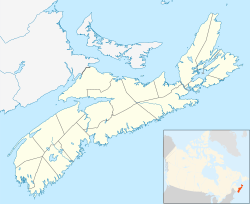Mulgrave, Nova Scotia facts for kids
Quick facts for kids
Mulgrave
|
||
|---|---|---|

Mulgrave Post Office
|
||
|
||
| Nickname(s):
Deep Water Port
|
||
| Motto(s):
"Come be a part of our Family"
|
||
| Country | Canada | |
| Province | Nova Scotia | |
| Municipality | Guysborough County | |
| Founded | 1800 | |
| Incorporated | December 1, 1923 | |
| Area
(2016)
|
||
| • Total | 17.83 km2 (6.88 sq mi) | |
| Elevation | 48 m (157 ft) | |
| Population
(2016)
|
||
| • Total | 722 | |
| • Density | 40.5/km2 (105/sq mi) | |
| Time zone | UTC-4 (AST) | |
| Postal code |
B0E 2G0
|
|
| Area code(s) | 902 | |
| Telephone Exchange | 747 | |
| Median Earnings* | $40,339 | |
| NTS Map | 011F11 | |
| GNBC Code | CBAQK | |
|
||
Mulgrave is a town located in Guysborough County, Nova Scotia, Canada. It sits right on the Strait of Canso, which is a narrow waterway. You can find Mulgrave along the Marine Drive and Route 344. The town got its current name in 1859. It was named after the Earl of Mulgrave, who was a colonial Lieutenant Governor.
Mulgrave is across the strait from the town of Port Hawkesbury. It started as McNair's Cove in the early 1800s. For a long time, the town's main job was helping people cross the water. Ferries carried people and goods between mainland Nova Scotia and Cape Breton Island. This ferry service began in the 1810s. Later, trains also came to the area in the 1880s. However, the ferry services stopped when the Canso Causeway opened in 1955. This caused a big change for the town's economy. In 2016, Mulgrave had a population of 722 people.
Contents
History of Mulgrave
Mulgrave was first settled by British Loyalists. These were people who supported Britain during the American Revolution and moved to Canada. They called the area McNair's Cove. In the early 1800s, the community became important for the lumber trade with England. The local Mi'kmaq people knew the area as Wolumkwagagunutk, which means "lobster ground."
Early Transportation and Trade
Regular ferry service across the Canso Strait started in the late 1810s. This ferry was very important for the local economy. In 1859, the community changed its name to Port Mulgrave. This was to honor the Earl of Mulgrave, who was the colonial Lieutenant Governor. Over time, the name became shorter, just "Mulgrave." Train service reached the community in 1882. By 1893, train cars were also being carried across the strait by special ferries.
Challenges and Changes
The town's economy faced a big challenge in 1870. Trade agreements for the fishing industry were canceled. This was done to protect the American fish market. As a result, Mulgrave's local fishing industry collapsed. Many people started to move away. By 1880, more than a third of the population had left. Most of them went to New England in the United States to find work.
By the early 1900s, railways became the main industry in Mulgrave. The town became a busy rail terminal. It had many services to support the trains. A new lobster factory also opened, and a new rail ferry helped carry even more goods across the Strait of Canso to Port Hawkesbury. Mulgrave was a key link between mainland Nova Scotia, Cape Breton Island, and even Newfoundland. In 1923, Mulgrave officially became an incorporated town.
The Canso Causeway's Impact
In August 1955, Mulgrave faced another major economic change. The Canso Causeway opened. This causeway is a road and rail link that connects mainland Nova Scotia to Cape Breton Island. It meant that road and rail traffic no longer needed to go through Mulgrave. This caused a big blow to the town's economy.
Population Changes
|
||||||||||||||||||||||||||||||||||||
Every few years, Canada counts its population in what is called a "census." In the 2021 Census, Mulgrave had a population of 627 people. These people lived in 292 homes. This was a decrease from its 2016 population of 722 people. The town covers an area of 17.83 square kilometers. In 2021, this meant there were about 35 people living in each square kilometer.
Public Services
The main office for the Eastern Counties Regional Library is located in Mulgrave. This library serves several counties in eastern Nova Scotia.
Notable Residents
- Wallace MacDonald (1891–1978), a famous silent film actor and director.
- Robyn Meagher, an athlete who competed in the Olympics.
Images for kids
 | James Van Der Zee |
 | Alma Thomas |
 | Ellis Wilson |
 | Margaret Taylor-Burroughs |




